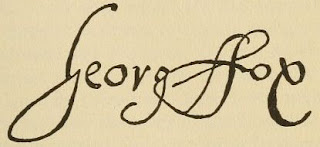Human Nature: A Modern Quaker View
 This short article was published in The Friend on 4th May 2018.
This short article was published in The Friend on 4th May 2018.
Jesus said to him, ‘Why do you call me good? No
one is good but God alone. Mark 10:18 (NRSV)
If
someone asked you to explain the Quaker view of human nature, how would you
respond? In my experience, we tend to say something like, ‘Quakers don’t really
do sin, we prefer to see the good in people’. However, over the centuries, Quaker
testimony has been an attempt to offer a divinely inspired response to aspects
of human behaviour and culture that are corrupting, unjust, and destructive.
This includes violence and war, the desire to amass wealth and power at the
expense of others, various forms of deceit and dishonesty, and inequitable social
relations based on class, gender, ethnicity, health and sexuality. So, while we
tend to affirm an optimistic view of human nature, our testimony seems to
communicate something a little different.
Reflecting
on this apparent contradiction, I consulted the Advices and Queries to see what light they might cast on the issue.
Somewhat surprisingly, the Advices and
Queries never speak of the fundamental goodness of humanity. Although one
section, number twenty-two, affirms the essential worth of every person by asserting
that ‘each one of us is unique, precious, a child of God’, most of the advice
given addresses the potential dangers and limitations associated with the human
condition. We are told that the Light ‘shows us our darkness’, and we hear how Robert
Barclay, in worship, found ‘the evil weakening in me’. We are
counselled to face up to unpalatable truths about our shortcomings, and the
importance of trying to ‘avoid hurtful criticism and provocative language’.
Over and over again, we are cautioned about the reality of human frailty, and the
temptations lurking within human culture, whether this is to do with the seeds
of violent conflict within us, prejudiced attitudes towards those who are not
like us, the pressure to lower our standards of integrity in order to fit in,
the dangers associated with gambling, alcohol and drugs, and the potentially destructive
power we have over other creatures and the rest of the natural world. All in
all, this doesn’t paint a particularly rosy picture of human nature.
Thankfully,
this is only part of the story. Although the Advices and Queries draw our attention to the darker aspects of the
human condition, they also point us to the remedy. We read that the leadings of
God ‘brings us to new life’ and that, in worship, Robert Barclay felt ‘the good
raised up’ in him. The Advices and
Queries describe the nature of God in terms of unconditional love,
compassion and forgiveness, and assure us that we can participate in these divine
virtues. God is good, and if we are attentive and faithful, the Spirit of
Christ can live through us. We are therefore called to live ‘in the virtue of
that life and power that takes away the occasion of all wars’, hatred, cruelty,
oppression and destructiveness. So, we are ‘fearfully and
wonderfully made’, frail and easily led, and the potential channels through
which God’s love, compassion and forgiveness are poured out on all creation.


Comments
Post a Comment